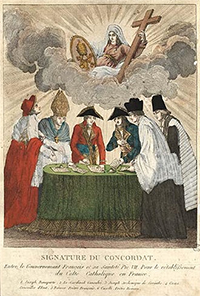The Concordat of 1801
The Concordat of 1801 was an agreement between France and the Pope that brought Catholicism back into the French fold after a few decades of ostracism. The doctrine of reason as a form of higher thinking was a driving force behind the Scientific Revolution and the Enlightenment, reinforced by French philosophes like Jean-Jacques Rousseau. That was one motivation for targeting the Catholic Church as a force of morality and motivation. The other was money. The National Constituent Assembly had seized Catholic Church properties and also issued the Civil Constitution of the Clergy; both of those sets of actions effectively made the Church subservient to the government. This was in keeping with actions taken by earlier kings, who had shown no difficulty seizing tithes and other Church revenues in order to stock the royal treasury. During the French Revolution, a number of radicals took this anti-Catholicism to an extreme and created an atheist order called the Cult of Reason. Reign of Terror architect Maximilien Robespierre outlawed that cult because he wanted to replace it with his own, the Cult of the Supreme Being, which had a deity but embraced a more rational form of appreciating that deity. His cult ended when his life did, but subsequent leaders did not put Catholicism back on its pedestal. As well, the governments of the Revolution had created and promulgated a new Calendar, which did away with religious holidays. 
Napoleon Bonaparte, in 1800 named First Consul, initiated an agreement with Pope Pius VII that came to be known as the Concordat of 1801. Other elements:
It took nearly two dozen rewrites before both sides were happy. The final version went into effect on April 18, 1802, on Easter.
|
|
Social Studies for Kids
copyright 2002–2026
David White




